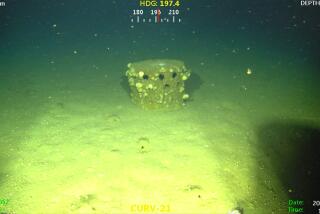Gulf War Toxins: Pentagon’s Credibility Sinks Ever Lower
- Share via
The Pentagon has raised to 20,000 its estimate of how many U.S. soldiers might have been exposed to toxic chemicals and nerve agents in Iraq in March 1991. That’s four times the number it announced just last month.
The larger figure reflects a prudent calculation that the zone of potential contamination around the Kamisiyah ammunition depot that was destroyed shortly after the end of the Persian Gulf War could be larger than originally thought. The Pentagon now wants to contact veterans who were within 50 kilometers--about 31 miles--of the site. Recently discovered battlefield logs indicate that another major demolition of Iraqi munitions may have taken place in the area as well, possibly spewing toxic agents into the atmosphere.
These estimates could change once a CIA computer model of wind patterns in the Kamisiyah area is finally up and running. Meanwhile, there no longer seems much doubt that many, perhaps most of the thousands of Gulf War veterans who are suffering from a variety of ailments, including chronic fatigue, digestive problems and joint pains, were made ill by the toxins they encountered in southern Iraq.
It should not have taken years for the Pentagon to make that connection. It should not have required constant prodding from Congress, veterans groups and the press before the Army eventually discovered in its files information vital to understanding the possible causes of what has come to be called Gulf War syndrome. Within weeks after U.S. troops blew up the Kamisiyah munitions depot, United Nations inspectors informed American officials that the site had contained chemical weapons. That report, typically, was classified, filed and forgotten. In subsequent years military doctors who examined ailing Gulf War veterans reported they could find no explanation for their mysterious ailments. The explanation in fact may have been in the files all along.
Simple bungling? Maybe. But perhaps also old habits of self-protectiveness asserting themselves. Soldiers, of course, have been known to fake ailments, and some illnesses can be self-induced or stem from causes unrelated to military service. But the military should have known it was blowing up deadly stocks of chemical agents; better to hide that either it didn’t know or didn’t act on what it knew. Whatever explains the Pentagon’s long insistence that it could find no link between Gulf War ailments and chemical agents, it’s clear now that it really wasn’t looking hard enough.
More to Read
Sign up for Essential California
The most important California stories and recommendations in your inbox every morning.
You may occasionally receive promotional content from the Los Angeles Times.










